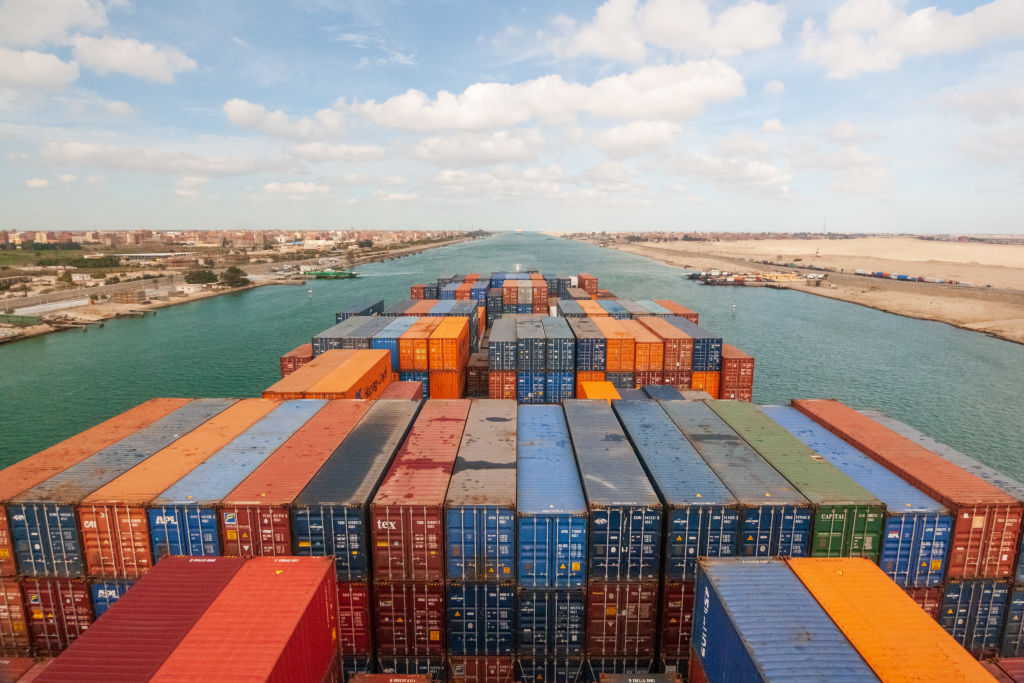 |
|
How—and Why—Yemen’s Houthi Rebels Are Poised to Seriously Disrupt the Global Economy

After two months, the crisis in the Middle East is poised to seriously disrupt the global economy as well as regional stability—thanks to the Houthis, a rebel Shi’a group in Yemen, and their successful effort to disrupt shipping through the Red Sea.
While attacks by the Houthis on commercial shipping began on November 19, they escalated last week, with the Yemeni rebels firing anti-ship ballistic missiles at several passing ships and hitting one (the first time such a weapon has ever been used successfully). As none of the ships were bound for Israel or owned by Israeli companies, the attacks signaled the Houthis were stepping up their efforts to pressure local commerce as a way to force Israel to suspend its campaign in Gaza.
Shipping companies got the message. Five of the largest shipping firms announced they would redirect their container ships away from the Bab al Mandab strait, the strategic waterway through which ships must pass on their way to the Suez Canal and which handles over 10% of global commerce.
Following the announcement, traffic through the Red Sea dropped by 35%. Commerce hasn’t been blocked completely, since most ships can opt for the longer but safer route around Africa, but the Houthis have increased the cost of shipping globally, imposing additional costs to commerce at a time when trouble at the Panama Canal has already made shipping more complicated and central banks worry about a new inflationary spike. If the Houthi “blockade” continues, the costs to consumers and the impact on local states will be considerable.
In the event that the Red Sea is closed long-term, Europe and states on the Mediterranean will bear the brunt of the damage. Some countries in North Africa, such as Tunisia and Algeria, are also particularly vulnerable as they do most of their Asian trade through the Suez Canal. Israel, the Houthis intended target, has suffered already as its seen traffic through its southern port of Eilat come to halt, though the port’s relatively small size has made the overall impact fairly manageable.
The big loser to a closed Red Sea is Egypt, which depends on transit fees through the Suez Canal for as much as one-fourth of its currency earnings. Already under strain from the humanitarian situation in Gaza and a moribund economy, Egypt’s authoritarian President Abdel Fattah al-Sisi may face major financial pressure if traffic through the canal slows.
A long-term disruption of traffic through the Red Sea will impact energy prices, particularly for consumers in Europe. About one-fifth of the traffic through the Suez Canal is oil, either on ships or sent across Egypt via the Sumed pipeline, with the total volume of crude oil and refined products shipped either way at nearly 9 million barrels per day (bpd), roughly 12% of total seaborne trade. A complete halt to oil shipments through the canal would be a significant disruption and would likely boost crude oil prices in 2024.
That gets to the purpose of the Houthi attacks. While the group wants to show off their capabilities and boost their regional prestige, like their patron Iran, the Houthis want to pressure Israel into ending its offensive in Gaza, and they’re likely to continue their attacks until that goal is realized. One way to do that is to increase international pressure on Israel, with the Red Sea acting as a pressure point, and it’s very likely the Houthis will continue their attacks for as long as Israel remains at war.
More From TIME
It may prove difficult to deter the Houthis through military force. Unlike Hezbollah, an Iran-backed group that faces a direct war with Israel, the Houthis are under little immediate threat, having now reached the brink of victory in their decade-long war with Saudi Arabia.
That’s what makes this a challenging situation for both the U.S. and the international community. Ensconced in mountain fortresses and flush with funds, the Houthis are heavily equipped with Iran-supplied arms, including accurate drones and anti-ship cruise and ballistic missiles capable of hitting a moving ship hundreds of kilometers away. Sitting on a large stockpile, they can keep up this campaign for a long time.
This all factors into U.S. thinking, which is currently focused on increasing the international naval presence around Yemen so as to deter or intercept new Houthi attacks. U.S. air strikes, along the lines of the “self-defense” strikes carried out in Iraq and Syria, would come nowhere near the kind of damage the group endured during their war with Riyadh. A sustained air campaign would degrade Houthi capability, but that would go against the other key U.S. goal—preventing the regional crisis from escalating to the point that Iran becomes directly involved.
Nevertheless, the Biden administration will feel increasing pressure to take action as long as these attacks and their disruptive effects continue.
MORE MUST-READS FROM TIME
- Taylor Swift Is TIME's 2023 Person of the Year
- Your Questions About the Colorado Trump Ruling, Answered
- Sam Altman on OpenAI and Artificial General Intelligence
- Essay: After My Parents Died, I Lost the Christmas Spirit . Now It's Slowly Coming Back
- You’ve Heard of Long COVID. Long Flu Is a Health Risk, Too
- The Surprising Origins of Popular Christmas Songs
- Column: Why the World Must Set a Price on Carbon
- The Most Anticipated Books of 2024
- Want Weekly Recs on What to Watch, Read, and More? Sign Up for Worth Your Time
CONTACT US AT LETTERS@TIME.COM
